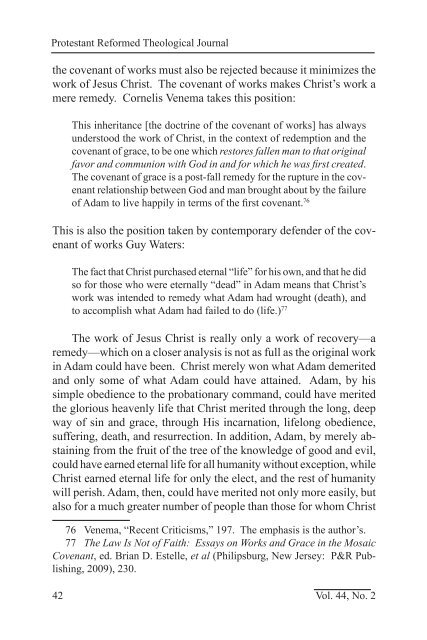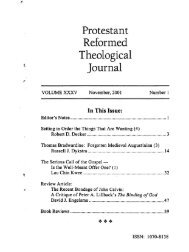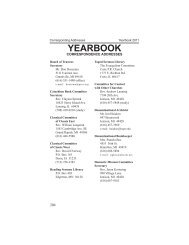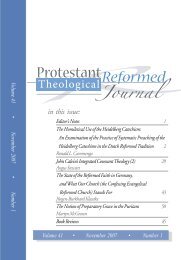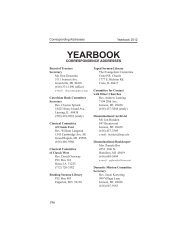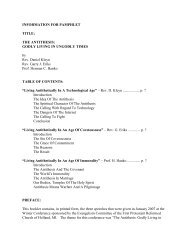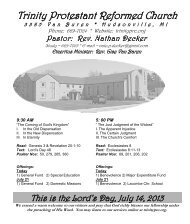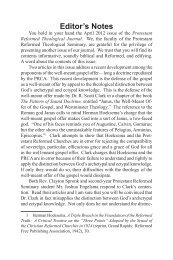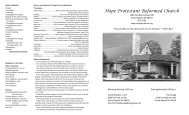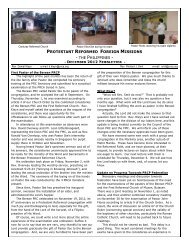A Critique of the Covenant of Works in Contemporary Controversy
A Critique of the Covenant of Works in Contemporary Controversy
A Critique of the Covenant of Works in Contemporary Controversy
Create successful ePaper yourself
Turn your PDF publications into a flip-book with our unique Google optimized e-Paper software.
Protestant Reformed Theological Journal<br />
<strong>the</strong> covenant <strong>of</strong> works must also be rejected because it m<strong>in</strong>imizes <strong>the</strong><br />
work <strong>of</strong> Jesus Christ. The covenant <strong>of</strong> works makes Christ’s work a<br />
mere remedy. Cornelis Venema takes this position:<br />
This <strong>in</strong>heritance [<strong>the</strong> doctr<strong>in</strong>e <strong>of</strong> <strong>the</strong> covenant <strong>of</strong> works] has always<br />
understood <strong>the</strong> work <strong>of</strong> Christ, <strong>in</strong> <strong>the</strong> context <strong>of</strong> redemption and <strong>the</strong><br />
covenant <strong>of</strong> grace, to be one which restores fallen man to that orig<strong>in</strong>al<br />
favor and communion with God <strong>in</strong> and for which he was first created.<br />
The covenant <strong>of</strong> grace is a post-fall remedy for <strong>the</strong> rupture <strong>in</strong> <strong>the</strong> covenant<br />
relationship between God and man brought about by <strong>the</strong> failure<br />
<strong>of</strong> Adam to live happily <strong>in</strong> terms <strong>of</strong> <strong>the</strong> first covenant. 76<br />
This is also <strong>the</strong> position taken by contemporary defender <strong>of</strong> <strong>the</strong> covenant<br />
<strong>of</strong> works Guy Waters:<br />
The fact that Christ purchased eternal “life” for his own, and that he did<br />
so for those who were eternally “dead” <strong>in</strong> Adam means that Christ’s<br />
work was <strong>in</strong>tended to remedy what Adam had wrought (death), and<br />
to accomplish what Adam had failed to do (life.) 77<br />
The work <strong>of</strong> Jesus Christ is really only a work <strong>of</strong> recovery—a<br />
remedy—which on a closer analysis is not as full as <strong>the</strong> orig<strong>in</strong>al work<br />
<strong>in</strong> Adam could have been. Christ merely won what Adam demerited<br />
and only some <strong>of</strong> what Adam could have atta<strong>in</strong>ed. Adam, by his<br />
simple obedience to <strong>the</strong> probationary command, could have merited<br />
<strong>the</strong> glorious heavenly life that Christ merited through <strong>the</strong> long, deep<br />
way <strong>of</strong> s<strong>in</strong> and grace, through His <strong>in</strong>carnation, lifelong obedience,<br />
suffer<strong>in</strong>g, death, and resurrection. In addition, Adam, by merely absta<strong>in</strong><strong>in</strong>g<br />
from <strong>the</strong> fruit <strong>of</strong> <strong>the</strong> tree <strong>of</strong> <strong>the</strong> knowledge <strong>of</strong> good and evil,<br />
could have earned eternal life for all humanity without exception, while<br />
Christ earned eternal life for only <strong>the</strong> elect, and <strong>the</strong> rest <strong>of</strong> humanity<br />
will perish. Adam, <strong>the</strong>n, could have merited not only more easily, but<br />
also for a much greater number <strong>of</strong> people than those for whom Christ<br />
76 Venema, “Recent Criticisms,” 197. The emphasis is <strong>the</strong> author’s.<br />
77 The Law Is Not <strong>of</strong> Faith: Essays on <strong>Works</strong> and Grace <strong>in</strong> <strong>the</strong> Mosaic<br />
<strong>Covenant</strong>, ed. Brian D. Estelle, et al (Philipsburg, New Jersey: P&R Publish<strong>in</strong>g,<br />
2009), 230.<br />
42<br />
Vol. 44, No. 2


